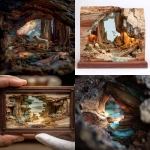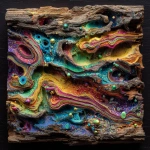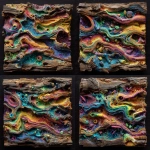Explore the Best AI Image Gallery

Blockchain in Finance: Transforming the Creative Industry
The intersection of finance and technology has always been a fertile ground for innovation. Recent years have seen the emergence of blockchain technology, with its decentralized and transparent nature, as a powerful force disrupting traditional systems across various sectors. The creative industry, known for its inherent value-sharing challenges and often complex ownership structures, stands to benefit significantly from blockchains unique capabilities.
Potential Uses in the Creative Industry
- Copyright Protection and Royalty Management: Blockchain can create immutable records of creative works, providing irrefutable proof of ownership and simplifying royalty distribution. Artists and creators can directly receive payments for their work without intermediaries, ensuring fair compensation.
- Digital Asset Ownership and Trading: NFTs (Non-Fungible Tokens) built on blockchain allow for the unique identification and ownership of digital assets, including art, music, and collectibles. This opens up new avenues for creators to monetize their work and fans to collect and trade limited-edition pieces.
- Supply Chain Transparency: Blockchain can track the provenance of creative goods, ensuring authenticity and combating counterfeiting. From raw materials to finished products, every stage of the supply chain can be recorded on the blockchain, providing consumers with transparency and trust.
- Decentralized Funding Models: Blockchain-based crowdfunding platforms can empower creators to directly access funding from supporters. This eliminates reliance on traditional gatekeepers and fosters a more equitable distribution of resources.
Ethical Considerations
While blockchain offers exciting possibilities for the creative industry, it also raises ethical considerations:
- Accessibility and Digital Divide: Ensuring that all creators have equal access to blockchain technology and its benefits is crucial. Bridging the digital divide and providing resources for education and training are essential.
- Data Privacy and Security: Blockchain transactions are transparent, but its important to consider the privacy of user data. Implementing robust security measures and promoting responsible data handling practices are paramount.
- Copyright Infringement and Intellectual Property: While blockchain can aid in copyright protection, malicious actors may still attempt to exploit loopholes. Continuous vigilance and legal frameworks are needed to address these challenges.
Future Trends
The future of blockchain in the creative industry is bright. We can expect:
- Increased Adoption: More creators, platforms, and institutions will integrate blockchain technology into their workflows.
- New Creative Applications: Innovative use cases will emerge, blurring the lines between physical and digital art forms.
- Cross-Industry Collaboration: Blockchains potential will be explored in various sectors, fostering collaboration and innovation.
Blockchain technology is poised to revolutionize the creative industry, empowering creators, promoting transparency, and driving innovation. As this transformative technology continues to evolve, it promises a future where creativity knows no bounds.











](https://images.ai-img.art/thumbnails/150/3b65287fef447a6ad61bcb18b5b9d03b6f6f74603ae0e058f81f4b91a3e02f36.webp)

](https://images.ai-img.art/thumbnails/150/7d9de60c58579b921ad140a9e1d752642452d5086b74a27d866e8af04608ed7d.webp)




](https://images.ai-img.art/thumbnails/150/ebc95932b25c17607076ed8d2a4bafc85c3371cf3f2d45c35741505fe3c97de1.webp)

](https://images.ai-img.art/thumbnails/150/98325fa7102e81df81f1dba6df8df52929b4fa41b058192faf3c77cf94513ff7.webp)




](https://images.ai-img.art/thumbnails/150/09314c003088f7174f747fa65105eca599e0842cf69e637ce4c98ebefd3f50ab.webp)


](https://images.ai-img.art/thumbnails/150/a31f622763ce0ecb2e76a907e566b81cfcc171e8d9b8b393f27681be24b6ca91.webp)





](https://images.ai-img.art/thumbnails/150/769518185300fcbda91b7bbf92b9007bc856379accd52eaf7983f9aec379e88e.webp)


](https://images.ai-img.art/thumbnails/150/914cb18c03c97bdba2f290c0ec1573d5792bf399dbad7f484614764eb31f4c2f.webp)







](https://images.ai-img.art/thumbnails/150/ac7218edd6198d49ed8d9853a5890595fc4d2a7a11c2e8a7ee8bcfbc7bfe265e.webp)



